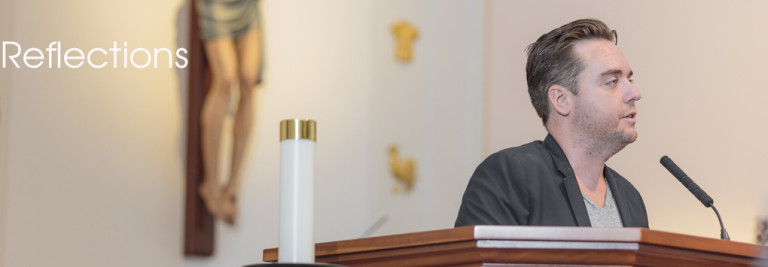“It is easier for a camel to pass through the eye of a needle than for one who is rich to enter the kingdom of God.” Wow! In our Gospel reading this week Jesus says a pretty shocking statement. It was shocking then, “The disciples were amazed at his words” the writer of Mark tells us (Mark 10:24). If it was shocking then in ancient Palestine, imagine how shocking this statement is in our country when our entire system of regulating human behavior is based on money, namely capitalism.
This Gospel reading has been interpreted throughout time in a variety of ways; frankly, I think it has been sanitized. We are terrified that this reading may make uncomfortable those of us who have attained wealth or work so hard to achieve it. We often say Jesus isn’t talking about actual wealth, He must mean the young man’s materialism, or that “the eye of the needle” was a passage that in order to enter we need to strip ourselves down. Many sermons have been preached in this way. I don’t necessarily disagree, except let us be intellectually honest: Jesus is clearly talking about material wealth and especially money. Even after the rich young man leaves Jesus uses the opportunity to preach on wealth. If the Gospel reading can seem uncomfortable – good. Jesus’ message should make us feel that way. How else could we embrace Jesus’ challenge in our lives?
It is vital when praying over this Sunday’s scriptures that the meaning of the text isn’t as simple as rich equals bad and poor equals good. As Hollis Phelps, assistant professor of religion, notes, “It’s important to point out that the callousness of the rich man does not appear to have arisen from any malicious intent (God or Mammon, 1). By all accounts the young man deeply loves the Lord and practices His teachings, he is clearly enamored and moved by Jesus. This makes the Gospel all the more complex! If the rich man were abusing his workers he would clearly be in the wrong, committing many sins, one of which would be greed, though here Jesus seems to be radically against the notion of money itself, or is it?”
Michael Lee of Fordham University warns of turning our spirituality into what he calls a “privatized faith” (U.S. Catholic, March 2010); that is to say, our faith cannot be just a personal relationship between our Lord and us— it has to be public. As Catholic Christians we must remember we are “a chosen nation, people set apart” (1 Peter 2:9) and as such not singular individuals with singular goals. “Do you not know brothers that you are the body of Christ?” (1 Corinthians 6:19). Paul reminds us, part of the body, not the whole. The rich man was a good believer but a private one. He heard Jesus’ words but could not believe truly that to “much is given, much is expected” (Luke 12:48). The rich man felt the “Kingdom of God” was at hand but didn’t see that the Kingdom is a very public one. Unlike the ascetics of the ancient world, hermits who fled from society in an eschatological fervor, the Kingdom Christ preaches is a very real, tangible and public Kingdom with public needs.
Likewise, if our faith is not private, then so mustn’t our private wealth. Private wealth should be intended for public need. Since money is a gift from God, Jesus is reminding us that the Lord is responsible for our gifts and we should share them, as we would share our gift of listening or creativity. With the great gift of money comes responsibility. Egregious sins of greed are as unjustifiable as giving a thousand dollars to a mentally ill man on the street. We must be good stewards since as Philip Goodchild reminds us, “money is a belief system, a [monetary] note is a promise” (Theology of Money, 165), and we must make good on them.
A dear friend of mine and an “unabashed one-presenter” who was speaking at Seton Hall University’s Micah Institute for Business and Economics, an initiative that introduces the business community to the Catholic perspective on business and economic life, spoke about how the world of work, with its very wealthy men and women of finance and business, are very needed to solve many of the issues facing our most vulnerable. He introduced me to the idea of “Effective Altruism.”
William MacAskill, philosopher and author of Doing Good Better: How Effective Altruism Can Help You Make a Difference writes, “The ethos of the Effective Altruism Movement is that you should use your time and money as effectively as possible. Sounds simple, but people trying to be good often lack the information to know whether they’re also being smart. When we rely on evidence and data to guide us—and not just rosy idealism—we end up reaching wiser, and sometimes surprising, conclusions about how to make a difference” (Doing Good Better, xi). Highly effective business people can and must teach us that our goals of building a just world must be manageable and create real, tangible results. Men and women of wealth are needed to build up the Kingdom of God. The rich man of the Gospels wanted to desperately help, so our Lord said to use the gifts I gave you, your money, give it all away. The man couldn’t, and I don’t think it was because he was greedy, but because he thought it was his money in the first place. That’s my two cents. Enjoy the week!
I’ll be seeing you,
Elliot



